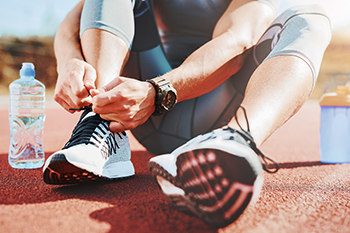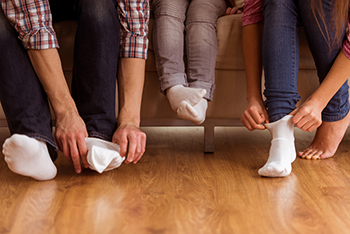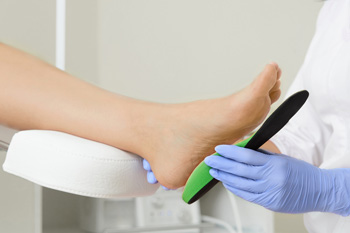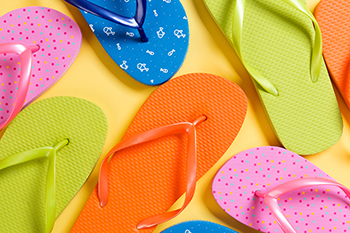Connect With Us
Blog
Items filtered by date: May 2022
Most Common Sports-Related Foot Injuries

Participating in sports involving running and/or jumping on hard surfaces puts one at more risk for injury than low impact sports, such as golfing or swimming. The truth is that if you participate in any sport, you will likely sustain an injury at some point. The most common foot injuries are plantar fasciitis, neuroma, turf toe, heel spurs, stress fractures, Achilles tendonitis, and tarsal tunnel syndrome. Plantar fasciitis happens when the band of tissue supporting the arch of the foot becomes inflamed or torn. A neuroma is a pinched nerve in the ball of the foot. Turf toe is caused by repeated hypertension of the big toe joint. A heel spur is when the plantar fascia stretches away from the heel and a bony calcium deposit forms on the bottom of the heel bone. A stress fracture is a small crack in the bone and happens when a bone cannot absorb the stress of repetitive impact. Achilles tendonitis is due to overuse, and the large tendon running from the bottom of the foot to the ankle is overstretched. Tarsal tunnel syndrome is when the posterior tibial nerve in the tarsal tunnel becomes compressed. Wearing well-fitted supportive shoes, stretching before sports participation, and not overdoing activity can help prevent such injuries. Resting after an injury before reengaging in the sport is vital. If you feel pain or have endured a sports-related injury, please consult with a podiatrist for a proper diagnosis and treatment plan.
Sports related foot and ankle injuries require proper treatment before players can go back to their regular routines. For more information, contact one of our podiatrists of Podiatry Care Specialists. Our doctors can provide the care you need to keep you pain-free and on your feet.
Sports Related Foot and Ankle Injuries
Foot and ankle injuries are a common occurrence when it comes to athletes of any sport. While many athletes dismiss the initial aches and pains, the truth is that ignoring potential foot and ankle injuries can lead to serious problems. As athletes continue to place pressure and strain the area further, a mild injury can turn into something as serious as a rupture and may lead to a permanent disability. There are many factors that contribute to sports related foot and ankle injuries, which include failure to warm up properly, not providing support or wearing bad footwear. Common injuries and conditions athletes face, including:
- Plantar Fasciitis
- Plantar Fasciosis
- Achilles Tendinitis
- Achilles Tendon Rupture
- Ankle Sprains
Sports related injuries are commonly treated using the RICE method. This includes rest, applying ice to the injured area, compression and elevating the ankle. More serious sprains and injuries may require surgery, which could include arthroscopic and reconstructive surgery. Rehabilitation and therapy may also be required in order to get any recovering athlete to become fully functional again. Any unusual aches and pains an athlete sustains must be evaluated by a licensed, reputable medical professional.
If you have any questions please feel free to contact our offices located in West Chester, and Broomall, PA . We offer the newest diagnostic and treatment technologies for all your foot and ankle needs.
Podiatry Services for Neurodivergent Children

While autism is a neurological condition some neurodivergent children, particularly those who are autistic, may have problems with their legs and feet to a greater degree than their neurotypical peers. Autistic children may have low muscle tone or hypotonia which occurs when limbs are floppy and hard to move. Given that autistic children react to external stimuli with sensitivity, their feet may be sensitive to the shoes they wear too. Children with this condition can be uncomfortable with any type of movement including walking, running, and even standing. Some children grow out of this while others do not. Such issues increase autism symptoms and can make the child unhappy or irritable. Specialized footwear, specific exercises, and orthotic inserts might help improve children’s movement. It is suggested that autistic children have regular visits with a podiatrist to check for foot discomfort and help to manage their symptoms.
The health of a child’s feet is vital to their overall well-being. If you have any questions regarding foot health, contact one of our podiatrists of Podiatry Care Specialists. Our doctors can provide the care you need to keep you pain-free and on your feet.
Tips for Keeping Children's Feet Healthy
- Make sure their shoes fit properly
- Look for any signs of in-toeing or out-toeing
- Check to see if they have Clubfoot (condition that affects your child’s foot and ankle, twisting the heel and toes inward) which is one of the most common nonmajor birth defects.
- Lightly cover your baby’s feet (Tight covers may keep your baby from moving their feet freely, and could prevent normal development)
- Allow your toddler to go shoeless (Shoes can be restricting for a young child’s foot)
- Cut toenails straight across to avoid ingrown toenails
- Keep your child’s foot clean and dry
- Cover cuts and scrapes. Wash any scratches with soap and water and cover them with a bandage until they’ve healed.
If you have any questions, please feel free to contact our offices located in West Chester, and Broomall, PA . We offer the newest diagnostic and treatment technologies for all your foot care needs.
What to Do About Stinky Feet

If your family members cringe when you remove your shoes, you may have a case of stinky feet. This unpleasant odor usually develops between the toes from the growth of micro-bacteria that thrive in damp, warm conditions. While stinky feet are unpleasant and can become chronic, there are some measures that can be taken to reduce the problem. The first and easiest suggestion is to develop a rigorous foot care regime to be practiced daily. Wash your feet with antibacterial soap, carefully washing between your toes. Dry the feet carefully and sprinkle them with corn-starch or absorbent foot powder. Wear wicking socks that draw the moisture away from the feet rather than trapping it, which can happen with 100% cotton socks. Change socks several times a day. Give your feet a chance to breathe by going barefoot for a while each day. Check that your shoes also give your toes room to breathe and consider alternating different pairs of shoes each day to let the sneakers dry out thoroughly. If the stinky feet problem persists or worsens, it is a good idea to visit a podiatrist who will have more advanced treatments available.
Everyday foot care is very important to prevent infection and other foot ailments. If you need your feet checked, contact one of our podiatrists from Podiatry Care Specialists. Our doctors can provide the care you need to keep you pain-free and on your feet.
Everyday Foot Care
Often, people take care of their bodies, face and hair more so than they do for their feet. But the feet are a very important aspect of our bodies, and one that we should pay more attention to. Without our feet, we would not be able to perform most daily tasks.
It is best to check your feet regularly to make sure there are no new bruises or cuts that you may not have noticed before. For dry feet, moisturizer can easily be a remedy and can be applied as often as necessary to the affected areas. Wearing shoes that fit well can also help you maintain good foot health, as well as making it easier to walk and do daily activities without the stress or pain of ill-fitting shoes, high heels, or even flip flops. Wearing clean socks with closed shoes is important to ensure that sweat and bacteria do not accumulate within the shoe. Clean socks help to prevent Athlete’s foot, fungi problems, bad odors, and can absorb sweat.
If you have any questions please feel free to contact our offices located in West Chester, and Broomall, PA . We offer the newest diagnostic and treatment technologies for all your foot and ankle needs.
Do You Suffer From Painful Feet?
What Goes Into Designing and Manufacturing Custom Orthotics

Designing and producing custom orthotics that will effectively treat the specific condition of a patient requires a great deal of work by a podiatrist. First, the patient must be thoroughly examined, and imaging tests may be necessary for the podiatrist to diagnose the condition. The podiatrist must then determine what type of orthotic is necessary to treat the condition. Orthotics are often categorized as either functional or accommodative. Functional orthotics may be created to help patients with conditions including plantar fasciitis, heel spurs, and pronation issues. They are typically manufactured with thinner and firmer materials. Accommodative orthotics use thicker, less rigid materials and can be used to treat neuropathy, diabetic foot conditions, Charcot disease, and more. Other considerations that podiatrists take into account when designing a custom orthotic include the patient’s lifestyle, the type of shoes they wear, their weight, and shoe size. If you are experiencing pain, discomfort or limited mobility, consult with a podiatrist to explore whether you can benefit from custom orthotics.
If you are having discomfort in your feet and would like to try orthotics, contact one of our podiatrists from Podiatry Care Specialists. Our doctors can provide the care you need to keep you pain-free and on your feet.
What Are Orthotics?
Orthotics are inserts you can place into your shoes to help with a variety of foot problems such as flat feet or foot pain. Orthotics provide relief and comfort for minor foot and heel pain but can’t correct serious biomechanical problems in your feet.
Over-the-Counter Inserts
Orthotics come in a wide variety of over-the-counter inserts that are used to treat foot pain, heel pain, and minor problems. For example, arch supports can be inserted into your shoes to help correct overarched or flat feet, while gel insoles are often used because they provide comfort and relief from foot and heel pain by alleviating pressure.
Prescription Orthotics
If over-the-counter inserts don’t work for you or if you have a more severe foot concern, it is possible to have your podiatrist prescribe custom orthotics. These high-quality inserts are designed to treat problems such as abnormal motion, plantar fasciitis, and severe forms of heel pain. They can even be used to help patients suffering from diabetes by treating foot ulcers and painful calluses and are usually molded to your feet individually, which allows them to provide full support and comfort.
If you are experiencing minor to severe foot or heel pain, it’s recommended to speak with your podiatrist about the possibilities of using orthotics. A podiatrist can determine which type of orthotic is right for you and allow you to take the first steps towards being pain-free.
If you have any questions please contact our offices located in West Chester, and Broomall, PA . We offer the newest diagnostic and treatment technologies for all your foot and ankle needs.
Frequent Flip Flop Use May Bring Consequences

Flip flops are considered to be the official shoe of summer. They are made from a flat rubber sole with a Y-shaped strap that that fits between the big and second toe. They are known to offer minimal, if no support, and, when frequently worn can cause foot conditions to develop. Among them are chronic heel pain and cracked heels. In addition, the walking style, or gait, may be negatively affected, and the toes may become fatigued from constantly gripping the top of the shoe to keep the foot in the shoe and in place. Some patients develop an Achilles tendon injury as a result of added pressure put on the calf muscles. It is suggested that people who enjoy wearing flip flops choose a pair with a thicker heel, which may alleviate some of the pressure on the overall foot. If you need to know more about how flip flops can affect the feet, it is advised that you confer with a podiatrist.
Flip-flops are not always the best choice of footwear. If you have any concerns about your feet or ankles, contact one of our podiatrists from Podiatry Care Specialists. Our doctors will assist you with all of your foot and ankle needs.
Flip-Flops and Feet
When the weather starts warming up, people enjoy wearing flip-flops. Flip-flops are comfortable, stylish, and easy to slip on and off; they're perfect for any summer beach goer. However, these shoes can cause harm to the feet.
How Can Flip-Flops Affect Me Long-Term?
- Ankle problems
- Hip problems
- Lower back problems
- Pain in the balls of the feet
- Problems with foot arches
- Changes in the way you walk
Are There Injuries Associated with Flip-Flops?
Yes. Since flip-flops are relatively weak and do not provide the same amount of support as sneakers, people who wear flip-flops regularly are more susceptible to injuries. On top of that, the open nature of the shoe makes your feet more prone to other problems, such as cuts and even infections. Common injuries and ailments include:
- Sprained ankles
- Blisters
- Infections
- Cuts and Scrapes
I like Wearing Flip-Flops. Are There Safe Alternatives?
When buying flip-flops, try to find ones that have sturdy soles and that are made of high-quality materials that will support for your feet. These flip-flops will cost more but will also last longer as a result.
If you have any questions please feel free to contact our offices located in West Chester, and Broomall, PA . We offer the newest diagnostic and treatment technologies for all your foot and ankle needs.

